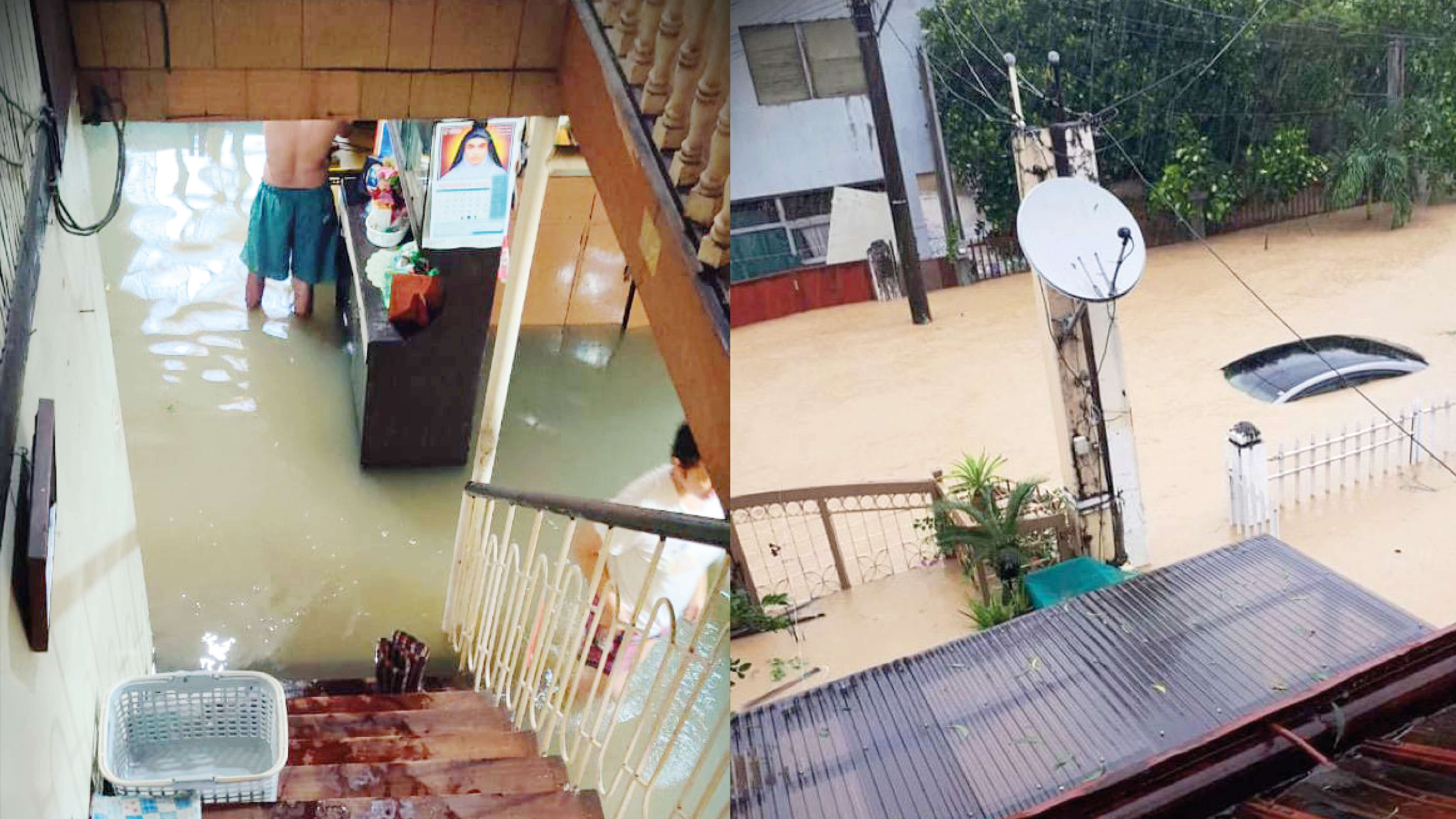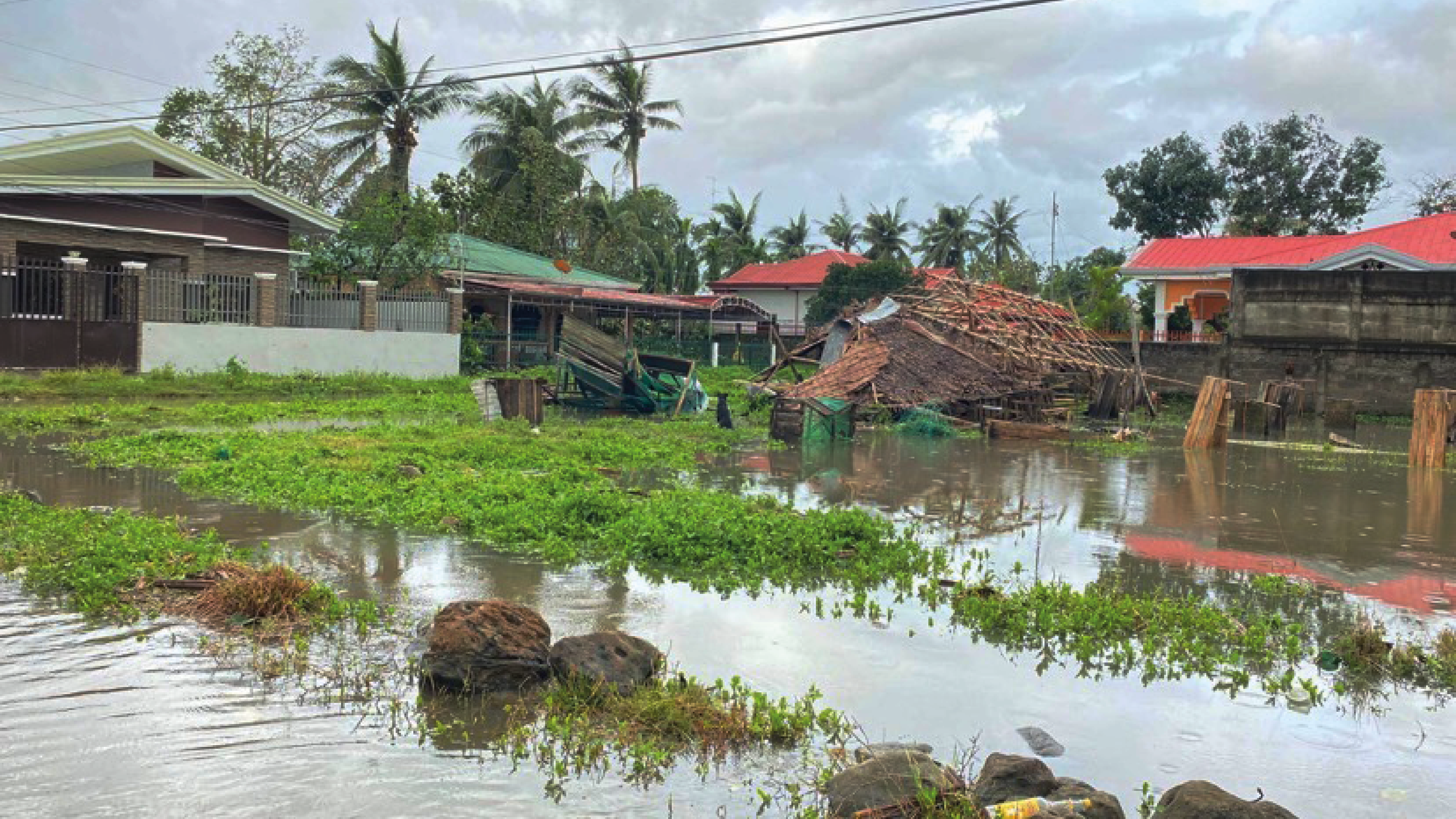Climate change causes more extreme weather events like flooding – and flood impacts can have health risks. What is it like growing up with floods as part of daily life?

Indoor and outdoor flooding in the Philippines, which is among the most vulnerable countries to flooding and other natural hazards in the world.

I hurriedly pulled a pair of rubber flip-flops from my backpack. They slapped on the concrete hallway floor as I slipped out of my black school shoes and packed them away. The murky grey water was now entering the building where I took my undergraduate classes at university. Rain poured outside.
My friend was doing the same familiar ritual beside me, giving a cursory inspection of our feet and legs, checking for any open wounds as a supposed precaution against leptospirosis — none.
Umbrella over my head, I watched my feet disappear into the cold, dark water and slowly made my way out of the flooded campus to higher ground, where I could hopefully catch a ride home.
I was born and raised in the Philippines, an archipelago of over 7,000 islands that sits on the Pacific Ring of Fire, where natural risks such as typhoons, earthquakes and volcanic eruptions are common. It gets battered by an average of 20 typhoons a year.
This constant barrage is a recipe for disaster. Poor urban planning and limited natural hazard preparedness mean low-lying areas are so prone to flooding that everyone feels the effects, even if you never walk through floods yourself. Roads become impassable, people get stranded, school is cancelled, services and workdays are disrupted, electricity and water supplies get cut off.
Climate change is making things worse, especially where health is concerned. The sixth Intergovernmental Panel on Climate Change (IPCC) assessment report published in March 2022 highlights that climate hazards such as flooding are “increasingly contributing to a growing number of adverse health outcomes”.
The Philippines is already among the most vulnerable countries to flooding and other natural hazards in the world. It’s also already among the places suffering the most from climate change. What will become of it in the coming years?
I cannot remember when flooding first entered my consciousness. Many moments live in my head in fragments, from different points in my life. Some stick out more than others.
There’s me as a child, all dressed up and ready to go, waiting for the announcement about whether school was suspended because of flooding and strong winds. Then as a teenager I anxiously watched the rising water on the street as it crept into our garage while heavy rain poured, my mother stuck at a McDonald’s somewhere waiting for floods to recede so she could get home.
There was the time my school uniform got soaked through from the rain, my umbrella practically useless in the strong wind. I held my skirt up anyway so it didn’t touch the floodwater. A friend and I shouted instructions at each other over the noisy rain so we could avoid the manholes we’ve long since mentally mapped out. They aren’t visible beneath the moving brown water, and people have fallen into them and died while wading through flooded streets.
Then there was a moment of hilarity. As my classmates and I made our way out of a flooded campus, a friend’s rubber flip-flops escaped her foot and floated up and away. She made the awkward chase through shin-deep water while we laughed it off, as if we were at the beach.
I cannot remember the first time I encountered floods. But it was and still is a sad part of life, especially now with the impacts of climate change.

A part of Bais City in the Philippines, my mother's hometown and where much of my extended family lives, experienced flooding in December 2021.

Climate change is making the world more susceptible to extreme weather events that cause disasters such as flooding, which in turn impacts human health in many ways from injuries and mental health problems to diseases and undernutrition.
Growing up in a tropical country that constantly faces natural hazards, you inevitably develop habits that contribute to your resilience – habits I never once thought to be unusual until I moved to London, England, five years ago.
The shift in my experience of the weather – from two seasons of wet and dry to an expanded four-season year – played heavily into this. I can never articulate the breadth of the changes in one go, but consider a few:
- Whenever I see stagnant water pooled somewhere, like a pot or a chair in the garden, my instinct is always to disrupt it or drain it, thinking it might turn into a breeding ground for mosquitoes – potential carriers of dengue fever and malaria. Both diseases are endemic to the Philippines. But I must remind myself that it’s not the same in London.
- I also no longer wear anti-mosquito lotions or patches, something I brought with me when I moved.
- There are no screens here to keep out mosquitoes when you open windows or doors. I now don’t have to mind a screen door each time I go out.
- I don’t pack rubber flip-flops into my bags when I go out, even when it’s meant to rain.
And yet, I’ve been lucky. I’ve never once been sick with dengue fever or malaria. I’ve never once had to lift household appliances onto high ground to save them or shovel floodwater from inside our home. I cannot say the same for many of my close friends and family. Just last year a cousin had dengue and my family didn’t have electricity for about two months after a strong typhoon devastated and flooded their city.
These days, whenever there’s a calamity, I get pictures from my friends of their flooded homes, stranded on the second floor with their companion animals and as many possessions as they can carry up the stairs.
Filipinos – and I suppose humans in general – are said to be resilient during disasters such as flooding, but I wish we didn’t have to be. People shouldn’t have to live through these things or rely on individual resilience.
But it’s important to remember that things are changing too.
The house I grew up in never used to flood when we lived there. Then in 2009, when Typhoon Ketsana came through, we heard the floods rose as high as the second floor. A family friend who still lives nearby sends us photos of the street when it gets bad, sometimes almost entirely submerging her car.
These changes are happening around the world.
I remember a day last year when I watched a downpour of rain while working by the window. To me, that rain felt unusual for London. It looked like the kind that resulted in flooding in Manila. I remember wondering out loud if London might flood too. It did.
How soon will more parts of the world become more intimately familiar with these disasters and living with them day to day? And what changes might that bring to people’s health?
When that happens, will the Philippines – and many other countries and islands on the frontlines of the climate crisis – still be recognisable?
We’re funding vital research into the impact climate change has on human health around the world, at national, regional and global levels. Explore our current funding call:
Advancing climate mitigation solutions with health co-benefits in low- and middle-income countries
Climate change causes more extreme weather events like flooding – and flood impacts can have health risks. What is it like growing up with floods as part of daily life?